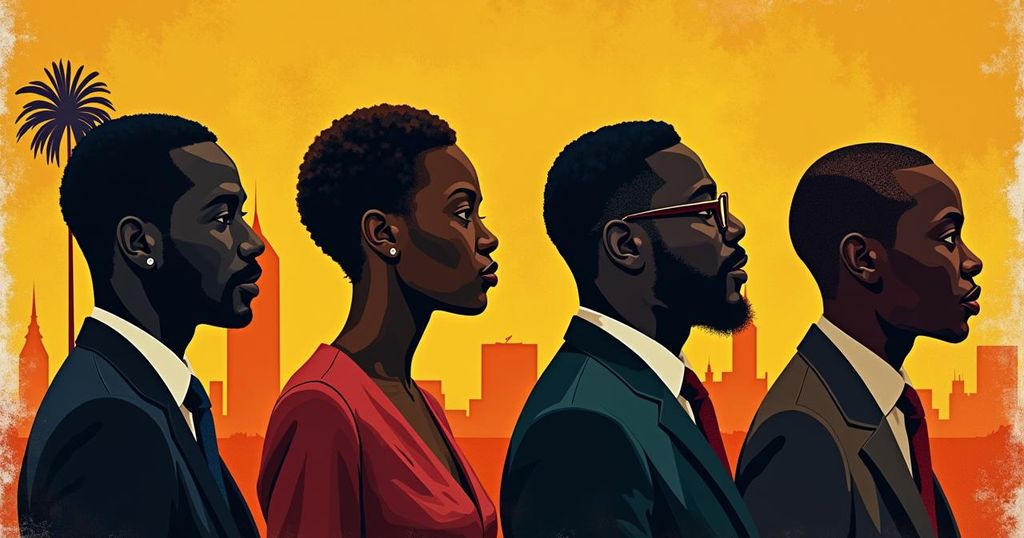Mozambique Elections: A Pivotal Moment for Change and Stability
Mozambique is preparing to vote in elections that could bring a post-independence born president for the first time, amid challenges including armed conflict and corruption. The election features four candidates, with young voters pushing for change. Key issues include security in Cabo Delgado, job creation, and climate resilience, as the country contends with pressing social and economic concerns.
Mozambique is set to conduct elections that could lead to the election of a president born post-independence from Portugal in 1975, marking a significant generational shift in leadership. Approximately 17 million citizens, out of a total population of 32 million, are eligible to participate in parliamentary and provincial elections across 11 provinces. The incumbent President Filipe Nyusi of the Mozambique Liberation Front (Frelimo) party will not seek re-election after eight years in power, possibly concluding the dominance of pro-independence leaders instrumental in the country’s liberation war. Nyusi’s administration has been marred by corruption, particularly highlighted by the tuna bond scandal which involved high-profile government officials and cost Mozambique approximately $2 billion. Public sentiment among voters is mixed; while some older Mozambicans express hesitance in shifting from traditional leadership, younger citizens are advocating for change, employment opportunities, and improved security amidst ongoing poverty and conflict in northern regions. Four candidates are vying for the presidency: – Daniel Chapo, 47, is favored to win due to his Frelimo affiliation. Chapo, who has recently distanced himself from Frelimo’s corruption scandals, has promised peace initiatives in Cabo Delgado, a region plagued by violence. – Ossufo Momade, 63, is the leader of the opposition Renamo party and is respected for his role in signing peace agreements, despite previously losing in elections amid allegations of fraud. – Venancio Mondlane, 50, known for his appeal among younger voters, has shifted from Renamo to a platform focused on transformative leadership. He is anticipated to generate support for his independent candidacy. – Lutero Simango, 64, who leads the Democratic Movement of Mozambique (MDM), aims to create jobs by ensuring local processing of natural resources. The elections come against a backdrop of pressing issues, notably the deadly conflict in Cabo Delgado linked to ISIL-affiliated groups. With urban poverty and unemployment rising, exacerbated by the COVID-19 pandemic, candidates are also raising concerns about climate resilience due to recent natural disasters. As the nation prepares to elect its president, voters must also select 250 members of parliament and provincial officials. The anticipation surrounding these elections reflects a country eager for change, but also wary of the potential for instability as the outcomes are declared. Partial results will emerge shortly after polls close, with official tallies released within 15 days, allowing avenues for contestation in the event of disputes.
Mozambique is a Southern African nation rich in natural resources yet currently grappling with significant socio-economic challenges, including corruption and armed conflicts. Following independence in 1975, the governing Frelimo party has maintained a dominant political presence, but its leadership is now facing increased scrutiny from younger voters dissatisfied with the status quo. The forthcoming elections are particularly consequential as they may introduce a deeply needed generational change amidst widespread poverty and unrest, particularly in cotton-producing Cabo Delgado where conflict has displaced millions.
The Mozambican elections represent a pivotal moment in its political landscape, with the potential to elect a younger leader committed to addressing pressing issues such as armed conflict, economic instability, and corruption. As candidates present their platforms to the electorate, the nation stands at the brink of change, with youth voters eager for transformative leadership to tackle the country’s numerous challenges.
Original Source: www.aljazeera.com




Post Comment